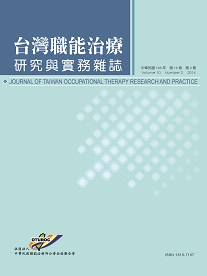Journal of Taiwan Occupational Therapy Research and Practice

半年刊,正常發行
目的:思覺失調症經常伴生認知缺損,而過去研究揭示體能活動及認知矯正訓練都可分別為此問題帶來改善。新近研究則主張發展體能活動合併認知訓練之複合式介入,體能活動對於神經可塑性的影響,將可使得認知獲益大幅提升。本文旨在探討體能活動改善思覺失調症患者認知功能的成效,以及體能活動合併認知訓練複合方案的效益,回顧研究成果並加以運用,將可為思覺失調症的早期治療帶來更佳的功能預後。方法:本文共回顧九篇相關主題之研究論文,主要針對兩項主題:(1)體能活動改善認知功能、(2)體能活動合併認知訓練之複合方案於認知面向的影響,進行資料蒐集,探討上述療法改善思覺失調症患者認知及其他功能的成效。結果:體能活動及與認知訓練合併之複合介入有助於改善思覺失調症個案的認知功能,特別是在處理速度、注意力/警醒度、工作記憶等個別面向,但對於推理與問題解決能力則未有顯著效果。此外,體能活動與認知訓練對於提升認知功能的成效具有獨立且互相補充的性質,複合介入可額外改善負性症狀、憂鬱、焦慮,並提升日常生活功能表現。結論:文獻回顧發現體能活動可改善思覺失調症患者的認知功能缺損,體能活動合併認知訓練可望帶來更佳成效,未來亟需取樣足夠大之樣本進行複合療法之隨機臨床試驗,以充實此服務領域之實證基礎。後續研究需探討介入依從性的關連因素,尋求有效對象特質,以利廓清致效機制。
Objective: Cognitive deficits are commonly seen in individuals with schizophrenia. Numerous studies have shown the effects of physical activity and aerobic exercise on physical fitness in schizophrenia. Recent research has shown that addition of cognitive remediation to physical activity may further improve treatment outcomes due to its impact on neural plasticity. This review aims to address the effect of physical activity on cognitive function and the additive effects of physical activity combined with cognitive training in schizophrenia. Methods: This review searched to include 9 relevant studies that have studied the effect of physical activity and the combined regimens of physical activity and cognitive training on physical and cognitive functions as well as psychiatric symptomology in patients with schizophrenia. Results: Physical activity may improve cognitive function, especially in processing speed, attention/ vigilance and working memory in schizophrenia. However, the effects were found to be little in the aspects of reasoning and problem solving, as well as verbal learning. In addition, physical activity and cognitive training have independent but complementary effects. Physical activity combined with cognitive training may improve negative symptoms, depression, anxiety, and functional performance in daily life situations. Conclusion: This review indicated that physical activity may improve cognitive deficits in patients with schizophrenia. Combining physical activity with cognitive training may activate neuroplasticity, and thus render greater improvements. The responders to such hybrid regimens and possible mechanism of therapeutic change underlying the intervention warrant further scrutiny. Future research based on randomized controlled trial with a sufficient study sample will improve research and knowledge in this area of practice. It is imperative to consider factors relevant to protocol adherence and identify responders to treatment in order to shed light on possible mechanism of change.












